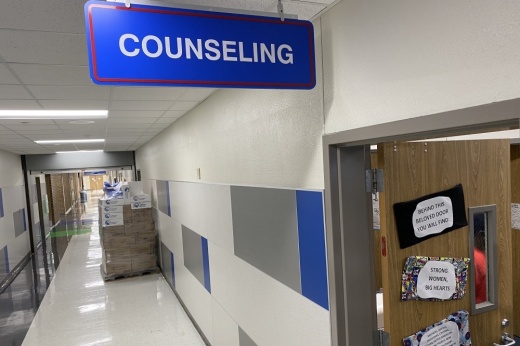Zooming in
Each district is mandated to have counselors at each campus. These counselors offer guidance with academic challenges, college and career readiness, social and emotional learning, bullying, suicide prevention, drug awareness and more.
All three districts also employ licensed social workers who can address more complex mental health needs and assist students who need additional intervention.
These services could include one-on-one counseling sessions or grief groups for students experiencing behavioral issues or significant trauma such as the incarceration of a parent or the loss of a friend.
LTISD employs four licensed mental health counselors, although two positions are currently vacant. The department also recently launched a community resource directory to connect families with crisis support, local mental health providers and more.
EISD employs school-based therapists who are either licensed social workers or professional counselors and each have a dedicated campus they work at.
“It’s allowed them to really get to know the students,” said Heidi Sauer, EISD director of counseling. “[The students are] just as comfortable coming in to look for a school-based therapist as they are the school counselor.”
LISD’s Student and Family Support Team consists of 15 licensed therapists who are split between the district based on their speciality and district feeder patterns.
Similar to EISD, LISD tries to keep these therapists connected with the same group of students when possible, said SFST coordinator Haley Simmons.
Diving in deeper
Breaking it down
While Sauer, Garrigan and Simmons all say their districts have prioritized mental health funding, additional state resources would allow schools to “make the choices they need.”
In the meantime, both the Eanes Education Foundation and Leander Educational Excellence Foundation help fund some therapist positions in its districts.
According to district data, LEEF allocated $157.5K toward counseling and mental health services and 2024-25. The district has also utilized $1.1 million from IDEA-B funds for students with disabilities and $49.4K from Title III funds for English-learner students.
“We're creative,” Simmons said. “We do what we have to do to make sure we have what we need to serve the kids.”
Garrigan said she is advocating at the regional level for increased support through grants and partnerships to potentially add more counselors or social workers to LTISD.
“At the end of the day it's that state allocation of money that we are waiting on, and unfortunately, it's being cut,” Garrigan said. “If we don't have the funding for positions, that's less people in the building that can help with mental health. ... It’s detrimental.”
For counseling and mental health services during Fiscal Year 2024-25, districts spent:
- $2.6 million in EISD
- $3.4 million in LTISD
- $18.9 million LISD
LTISD is planning to develop a parent workshop series next school year to educate community members about various topics to better support student mental health, Garrigan said.
EISD has also worked to offer other innovative counseling support through Texas Child Health Access Through Telemedicine, or TCHATT, Sauer said.
Offered to middle and high school students who are referred by school-based therapists, the free virtual program assesses students experiencing high-risk mental health concerns and provides up to five intervention sessions with a licensed provider.
Quote of note
“When you've got kids [who are] hungry or they're sad or they just lost their parent, how are we expecting them to function as students academically if their needs need to be met emotionally?” Garrigan said.





